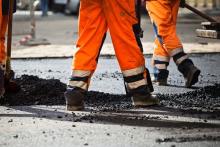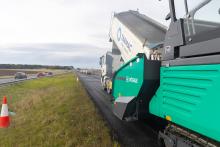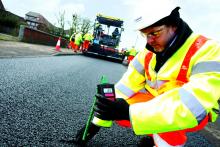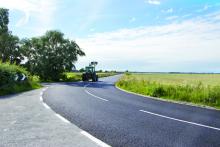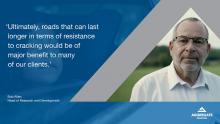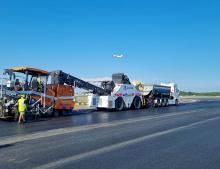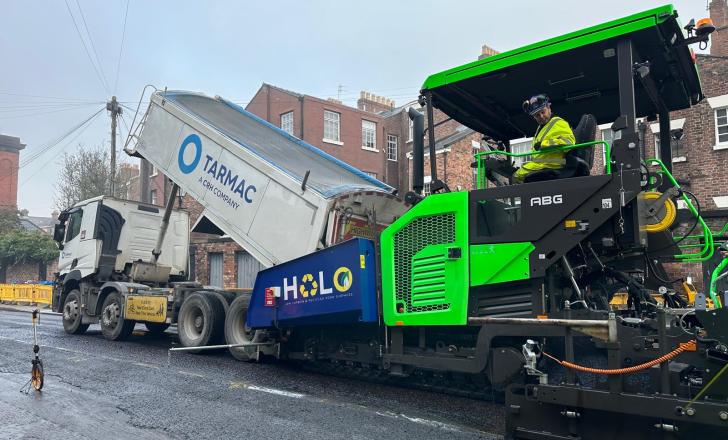
No industry is immune to change, particularly against the backdrop of a climate emergency. Net zero targets for local authorities and highways network operators in the UK have been a catalyst for a change in how highways projects are procured as well as the savings and outcomes that must be delivered.
Over 80% of local authorities in the UK have declared a climate emergency, and over 90% in England and Wales have a net zero pledge, with more than half committing to 2030 as their target date. While these commitments are often focused on ensuring that the buildings they own and manage meet the carbon saving targets, it is changing requirements and behaviours in the delivery and maintenance of assets including highways.
According to Liam Brown, Commercial Director at Huyton Asphalt, the business is witnessing a growing change of behaviours in the approach to sustainability across the industry: “Price and quality are still part of procurement criteria but the importance of carbon saving and the ability to provide customers with new innovation and data-led guidance about materials is on the rise.”
“While we have not yet reached a point where carbon reduction is the main procurement driver and local authority funding from central government remains challenging, the message from many customers is that they are willing to find ways of adopting innovation faster. They are prepared to overcome some of the historical barriers that have previously stifled highways specification.”
Liam continues: “Highways teams in many cities and urban areas are working for councils or infrastructure clients with a greater focus on using approaches that deliver improved carbon, air quality and productivity outcomes. It’s important to be able to respond to that need and also key to our business’ sustainability strategy.”
Against this backdrop, a key focus for Huyton Asphalt has been to work collaboratively with a specialist technical third-party to develop and deliver an extensive range of bespoke materials for its projects.
The company has been working with leading construction materials business Tarmac since its inception, but in 2008 formed a partnership that has moved far beyond a traditional and transactional relationship to one of peer-to-peer collaboration which is focused on material innovation and data-led reporting.
Megan Thompson, technical product support manager at Tarmac explains more: “Being able to identify and offer clients value-added solutions that move far beyond a ‘tick-box’ criteria for sustainability has really underpinned the partnership between Tarmac and Huyton Asphalt, which has been pioneering in the way that we’ve been able to collaborate with our customers.
“Knowledge sharing is not just encouraged, it is ingrained in the fabric of the relationship. From providing support at events to impromptu brainstorming sessions, there is a constant two-way flow of ideas. This open exchange creates space for innovation, where sustainability challenges are viewed as opportunities and every conversation has the potential to spark new ideas and concepts.”
Delivering material innovation
A key outcome of the relationship has been Huyton Asphalt’s ability to roll out its Innovation Halo range of low carbon, sustainable materials for its customers, which have been developed by Tarmac and include everything from warm mix asphalt to surfacing products that use rubber from recycled car tyres.
Deployed at scale, the products are delivering tangible sustainability savings across the network. Taking one example, earlier this year, Huyton Asphalt delivered a major surfacing project in Deeside, North Wales involving over 17,000m2 of carriageway resurfacing.
Over 9,000 tonnes of Halo warm mix and 1,600 tonnes of Halo Rubberpave was installed throughout each layer of the full carriageway, including more than 2,600 tonnes of recycled asphalt pavement (RAP). Using these materials, the team delivered a carbon saving of 57.3 tonnes – a 13% reduction in emissions and the equivalent of driving a family sized car over 520,000km.
James Blennerhassett, Managing Director at Huyton Asphalt comments: “Requiring less energy for production and application, warm mix asphalt significantly reduces carbon emissions whilst maintaining quality and durability. It is typically produced at 20-40˚C lower than hot asphalt, reducing the embodied carbon of the material by 8-12%, depending on plant efficiency.
“Lower production temperatures not only decrease emissions but also allow work to be completed in less time, reducing disruption for road users, as well as deliver significant health and safety benefits.
“Warm mix has also proven to be safer to work with in poor weather conditions. When traditional hot asphalt is laid in wet weather it can create a lot of steam, impacting visibility. However, just a 10˚C reduction in temperature halves the fumes created. Less steam from the lower temperature warm mix means better visibility and much safer working not just for our teams but also the communities in which they work.”
Rubber roads
Warm mix has quickly become a default product for Huyton Asphalt’s customers, but the technology is also being applied to other new innovations and environmentally sustainable asphalts. The company’s BBA approved Halo RubberPave material is helping to repurpose and recycle the rubber from end-of-life tyres (ELT) into the UK’s roads, contributing to a circular economy.
When combined with warm mix technology, it has been calculated to deliver an average saving of 3.5kg of CO2e per tonne compared to traditional asphalts.
Tarmac’s Megan Thompson comments: “For every kilometre of highway surfaced, rubber asphalt can reuse the rubber of up to 750 waste tyres, helping to reduce the 120,000 tonnes of rubber waste, including 500,000 tyres, that are exported from the UK annually. Using the waste tyre stream in asphalt also provides an additional disposal route in the UK.
“The end material is a durable, high-performance asphalt using SMA technology that’s suitable for most locations, from heavily trafficked motorways to rural roads. Since we helped to bring the technology to the market no other partner we work with has been able to pioneer its use and deliver and develop the product on the same scale as Huyton Asphalt has been able to.”
In 2022, Huyton Asphalt’s project on Kingsley Road for Liverpool City Council became the first rubber road in the north west of England. Over 800 tonnes of RubberPave asphalt were laid along with 1,000 tonnes of warm mix, saving in total nearly 6 tonnes of CO2 (a 9% carbon reduction that saved the equivalent emissions of driving a car almost 47,000km).
The innovation doesn’t stop there, however, with the partners already looking ahead to understand how new materials can bring opportunities to build carbon sinks into roads, for example.
Developed by Tarmac and its supply chain and championed by Huyton Asphalt, biogenic asphalt binder technology effectively locks away carbon absorbed during the growth of the biomass element, turning the road into a carbon sink.
Since the asphalt can be recycled at the end of the pavement life, most of this carbon will not re-enter the atmosphere. According to available data, biogenic asphalt technology could potentially reduce the carbon footprint of a typical asphalt mix by up to 40%.
Ian Carr, Regional Technical Manager at Tarmac adds: “By adopting a whole life approach and investing in better materials such as biogenic asphalt, engineers can break the cycle of repeated deterioration and running repairs which can be costly in terms of maintenance budgets and carbon emissions.
“As a business, Tarmac has ambitious targets to achieve net zero and working with customers like Huyton Asphalt who share our goals and are willing to promote low carbon solutions is necessary to deliver change through new ways or working.
“Our close collaboration has also allowed us to look beyond asphalt too, which saw them become the first to use our low-carbon CEVO concrete in the application of a bus station upgrade for Merseytravel. Low carbon concrete is increasingly popular due to its sustainability credentials – in this instance it has achieved a 49.1% reduction in carbon emissions while maintaining the durability, strength and resilience of traditional concrete.”
Driving data-led decision-making
In the journey to sustainable roads, what gets managed gets measured.
A data-led approach to plant and product-specific carbon footprints allows local authorities and asset owners to make informed decisions about how funding is allocated across the network and enables projects to maximise sustainability benefits.
Ian Carr adds: “As an industry we need to be able to record and analyse, in real time, the work that contractors are undertaking on the road network because it’s only by doing this that a highways authority or network operator can have a detailed and holistic view of their asset now and into the future.
“Creating a transparent, accountable system to measure and share carbon data benefits the entire industry. By setting exacting standards for data quality and specificity, we are working with Huyton Asphalt to raise the bar.”
Sophie Colleran, Sustainability Manager at Huyton Asphalt explains how this is taking shape.
“As councils work towards their net zero targets, they are understandably making more decisions based on data that provides clarity on embodied carbon and lifecycle impacts. Working with Tarmac to provide detailed breakdowns of plant and products emissions demonstrates our commitment to deliver with reduced carbon front of mind.”
However, the shift toward highways authorities engaging with innovative solutions and targeting changes to procurement models has not been without its challenges.
James Blennerhassett, Managing Director at Huyton Asphalt adds: “Alongside sustainability there is always a requirement to deliver value for money. We need to demonstrate the long-term value of the newer solutions, both environmentally and economically. Optimising processes and leveraging economies of scale is important to make sustainable options more accessible and attractive to our customers.
“Our work with Tarmac not only focuses on meeting current demands, but also on how we can shape the market and set new standards for the industry. By using data we can demonstrate the long-term performance and efficiency benefits of new innovation, which in turn is helping to shift the dial on sustainable procurement practices.”
As Government funding to local authority budgets remains uncertain, embedding sustainable delivery into procurement is essential. Closer collaboration within the supply chain must become standard practice to create an environment that can deliver greater sustainability through genuine product innovation, data-led efficiencies and high-quality delivery.
Partnerships between materials suppliers and contractors that foster trust, drive carbon savings, and maintain a focus on measurable outcomes are making change happen.



